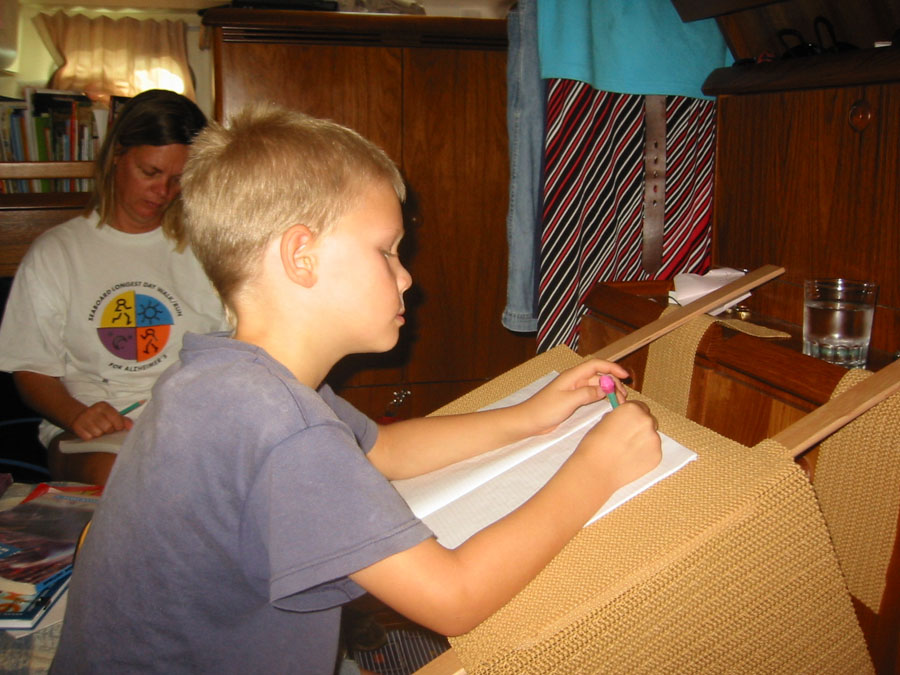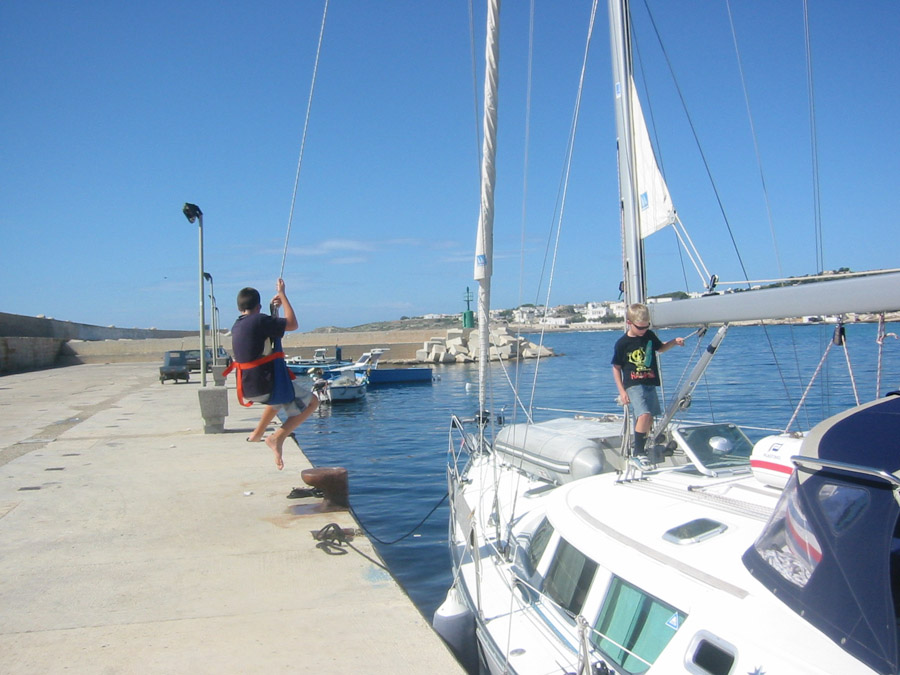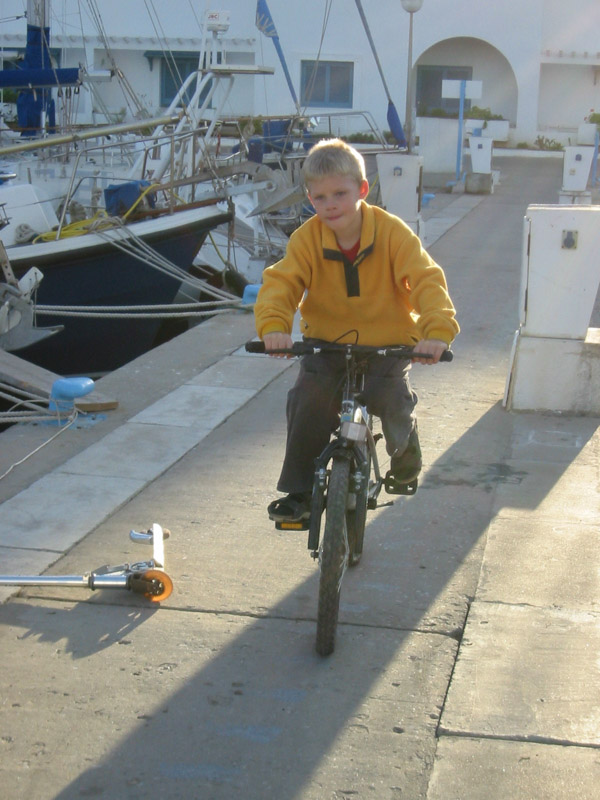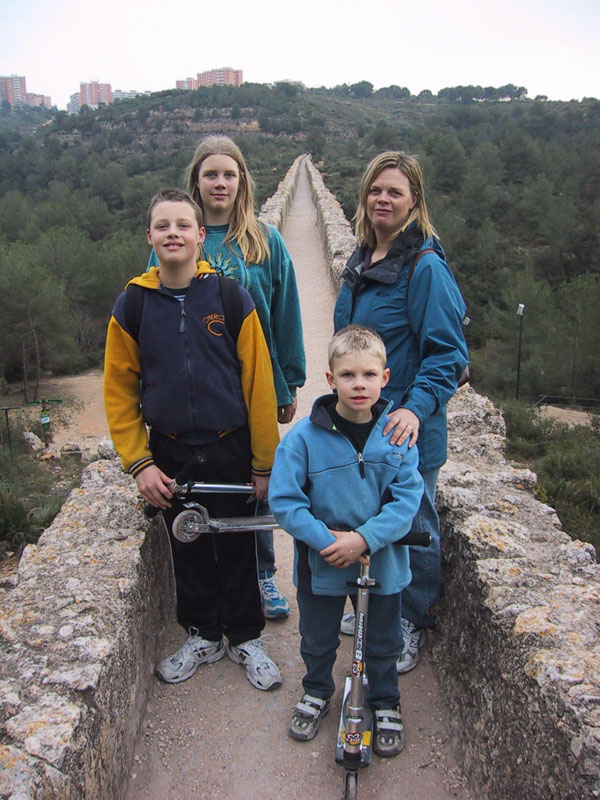Home Schooling Part II
Parent Versus Teacher

Allen's School Room in the Aft Cabin
One of the biggest personal challenges Karalee and I found with home schooling was making the switch from parent to teacher. Becoming a compassionate and encouraging teacher was challenging when one of our students spent four hours staring at their English assignment without answering the first question. We asked Jocelyn, Kevin, and Allen to call us "Teacher" once the school day started. This was mostly for our benefit and calls of "Teacher, Teacher" helped remind us that we were supposed to be teaching and not parenting at that moment.

Swinging from a Halyard at Recess
We are often asked how long it takes to home school children. The answer is a lot of time, although less than children who are in a regular school. On school days, we started school at 8:30 with recess around 10:30 to 11:00. Lunch was from noon to 1:00, when school resumed until 1:30 to 2:30. We started the school year in early September and sustained at least four days of school a week until early May. For GVDES, all school work has to be mailed in by mid- to late May so that it can be marked in time and report cards issued by June. Some days we would break for recess, meet up with other cruisers, have coffee, go for an adventure, or just a swim and not resume school until mid afternoon, if at all that day. Flexibility is the watch word when cruising and home schooling.

Allen Learning to Ride a Bicycle on the Dock in Tunisia
Our second winter we stayed in Tunisia for five months and had school every week from November to April, with only two weeks off for Christmas and a week off for Spring Break. This discipline brought us the reward of finishing school before the end of April, giving us four uninterrupted months of cruising with absolutely no worries about school. While in Tunisia, we also squeezed in a week long adventure to the Sahara Desert where we toured by camel for three days and two nights, plus visits to Matmata, Sousse, and Kariouan, the fourth most holy place in Islam.
In our first year, Karalee taught Allen Grade One and I taught Jocelyn Grade Seven and Kevin Grade Five. Grade One required intensive interaction with Allen, so this worked well, but it meant that we never got a break. In our second year, once Allen could be more independent, one of us taught all three children, one week on and one week off. This allowed the "off" parent time to work on other projects and be focused on projects outside of school (useful on boats where the project list is never done). The reality is that Jocelyn largely taught herself, Kevin was about 50/50, and Allen required 75-80% of our attention. There were times when the children could largely work by themselves and other times when all three required intensive help, each having to wait their turn to get the teacher's attention, just like they would in a regular school environment.

Kevin, Jocelyn, Allen, and Karalee on the Aqueduct in Tarragona
Other cruisers would remind us on a regular basis that there was also the school of our adventure. Navigating, shopping, cooking, boat maintenance, exploring, sailing, dolphins, storms, calms, watches, and new cultures and experiences were part of how we lived every day. We made sure to keep up with English and Math, but didn't get too worried if we got behind on other subjects. We also incorporated the curriculum into our adventure. Jocelyn's Grade Seven social studies included Roman history and we visited Barcelona's roman artifacts and Tarragona's aqueduct to give Jocelyn first hand experiences of the history she was studying.